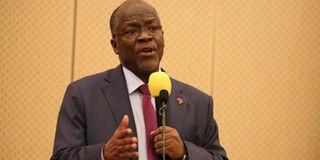THINKING ALOUD : The President cannot succeed without a competent team

President John Magufuli
What you need to know:
- First the owner of Dangote cement had to fly in and see President Magufuli in person to sort out the pending problems in the cement factory in Mtwara and secondly Swahaba Shosi, a widow from Tanga seeking justice in a public place by raising a placard that caught Presidents attention.
I have in my writings pointed a couple of times the importance of teamwork in order to succeed. Lately some disturbing events have taken place that show there is lack of teamwork in the current government.
First the owner of Dangote cement had to fly in and see President Magufuli in person to sort out the pending problems in the cement factory in Mtwara and secondly Swahaba Shosi, a widow from Tanga seeking justice in a public place by raising a placard that caught Presidents attention.
The logical question is what is the root cause of this, why did this situations have to reach the President for solutions, is this the standard procedure?
Previously I wrote that some of us still believe in Ujamaa and the Arusha Declaration but these did not achieve the goals because those surrounding Mwalimu had their own suspicions and were not supportive. Internet is full of documents why President Magufuli is the most popular not only in the region but in Africa and globally. From one site I was able to download eight reasons why he has been so successful:
1. He came from humble beginnings
2. He’s shown integrity
3. He campaigned for the presidency on a platform of hard work
4. He’s been keeping his promises
5. He’s been leading by example
6. He’s been channelling Tanzania’s monetary sources to more important ventures
7. He made education free for children
8. He keeps civil workers on their toes, so they don’t mess up
But the problems are so many and so huge that on a solo basis he will not be able to resolve and he may not succeed. The two events amplify that his chosen and selected team is not helping him. Why should the investors problems reach the President-where was the minister and high officials within the ministry of trade and the ministry of energy, why were they not able to resolve the problems the plant was facing and why was it resolved in one meeting with the President maybe lasting an hour or so? These are pertinent questions and similarly why the minister of justice, head of policy not able to solve the problem of the widow. These are deep and serious problems – inertia on the part of civil service workers, corruption, dishonesty, lack of accountability and more seriously not being in line with the policies and functionaries of the President.
For any successful leader teamwork is absolutely a prerequisite and essential. Melodious music only comes out when the orchestra plays the instruments in harmony otherwise what comes out is bad music. The top five characteristics of some of the world’s most successful political leaders include:
Honesty: Being honest can sometimes be difficult because it makes individuals vulnerable. It reveals who we really are and discloses our mistakes, which gives others the opportunity to criticise or reject openly. Honesty develops character and builds credibility and trust, which are the foundation to evoke confidence and respect from those around you, and in the case of political leaders, teammates and constituents.
Compassion: Compassion is the humane quality of understanding the suffering of others and wanting to do something to alleviate that suffering. While many see compassion as a weakness, true compassion is a characteristic that converts knowledge to wisdom. Good political leaders use compassion to see the needs of those he or she leads and to determine the course of action that would be of greatest benefit to all those involved.
Integrity: The word integrity is defined as ‘the adherence to moral and ethical principles; the soundness of moral character.’ It is a synonym for honesty and uprightness, and is a vital characteristic for those in political leadership. Political leaders who possess integrity can be trusted because he or she never veers from inner values, even when it might benefit them to do so. A leader must have the trust of followers. This requires the highest standard of integrity.
Confidence: Having confidence in a political leader is about having faith or belief that he or she will act in a right, proper, or effective way. A good political leader needs to be both confident in himself or herself as well in their ability to lead. Leaders who possess this quality inspire others, drawing on a level of trust, which sparks the motivation to get others on board and get the job done.
Flexibility: Flexibility for a political leader is about understanding the give-and-take aspects of politics, and the ability to find the common ground. Good politicians listen carefully to all sides, to not only hear their arguments but to especially learn what it will take on behalf of all parties involved to reach a consensus. This characteristic allows political leaders to recognise setbacks and criticism, to learn from them and move forward.
Great political leaders have all of these qualities and more. Each aspires to respect different views, analyse problems, and identify the best solutions - not based on loyalty to political party, but rather based on what is good and right and in the best interest of the nation as a whole.
Mr President we sincerely want you to succeed and you are the hope of millions in Tanzania and Africa. Please ensure that you have the right team with you.
Zulfiqarali Premji is a retired Muhimbili University of Health and Allied Sciences (Muhas) professor Currently living in Canada




